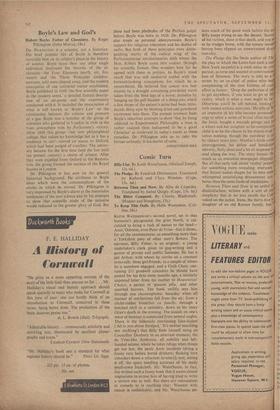Boyle's Law and God's
Robert Boyle: Father of Chemistry. By Roger Pilkington. (John Murray, 18s.) Da. PILKINGTON is a scientist, not a historian. His brief popular life of Boyle is therefore naturally best on its subject's place in the history of science. Boyle more than any other single individual destroyed the theories of the al- chemists—the Four Elements (earth, air, fire, water) and the Three Principles (sulphur, mercury, salt) were cleared away, and the modern conception of one universal matter established. Boyle published in 1660 'the first scientific paper in the modern sense,' a detailed factual descrip- tion of an air-pump and the experiments conducted with it. It included the enunciation of what is still known as 'Boyle's Law' on the relationship between the volume and pressure of a gas. Boyle was a member of the group of scientists who gathered in London in 1646 in the freer, atmosphere won by Parliament's victory. After 1648 this group—'our new philosophical college, that values no knowledge but as it has a tendency to use'—moved en masse to Oxford, which had been purged of royalists. The univer- sity became for the first time (and the last until the present century) a centre of science. After they were expelled from Oxford at the Restora- tion. the group formed the nucleus of the Royal Society in London.
Dr. Pilkington is less sure on the general historical background. He attributes to Boyle ideas which were the commonplaces of the circles in which he moved. Dr. Pilkington is very impressed by Boyle's alarm at the materialist tendencies of the new science and by his attempts to show that scientific study of the universe would redound to the greater glory of God. But
these had been platitudes of the Puritan pulpit before Boyle was born in 1626. Dr. Pilkington also treats as personal idiosyncrasies Boyle's support for religious toleration and his dislike of oaths. But both of these principles were distin- guishing marks of the radical wing of the Parliamentarian revolutionaries with whom the Hon. Robert Boyle came into contact through his scientific friends. One wonders how far he agreed with them in politics. In Boyle's mind much that was still medieval jostled with the forward-looking conceptions for which he is remembered. He believed that cancer was best treated by a draught containing powdered warts taken from the hind legs of a horse; jaundice by hanging up the gall-bladder of a sheep into which a few drops of the patient's urine had been intro- duced; filmy eyes by blowing dried and powdered excrement into them. The present reviewer finds Boyle's laborious attempts to show `that by being addicted to Experimental Philosophy a man is rather assisted than indisposed to be a good Christian' as irrelevant to today's needs as these remedies. Dr. Pilkington asks us to take the former seriously. It is a matter of taste.
CHRISTOPHER HILL


































 Previous page
Previous page